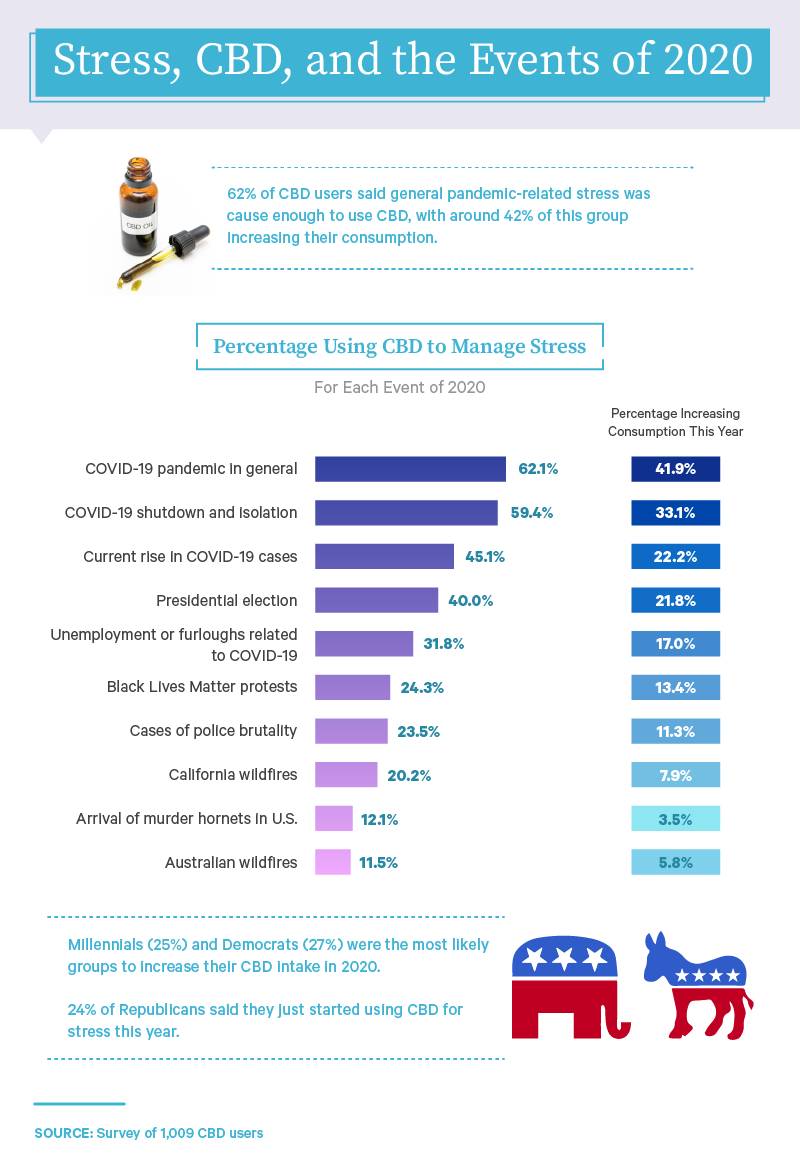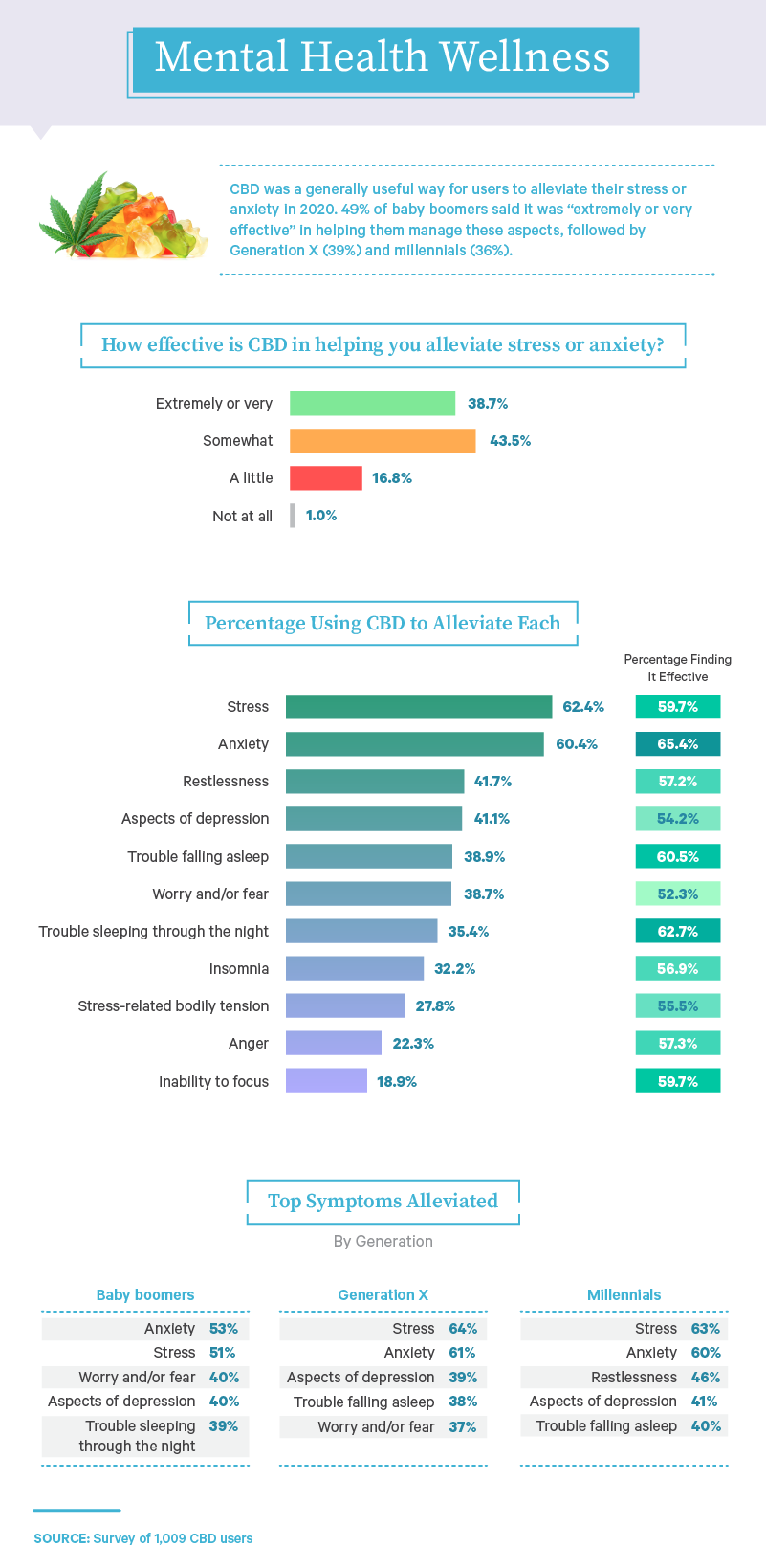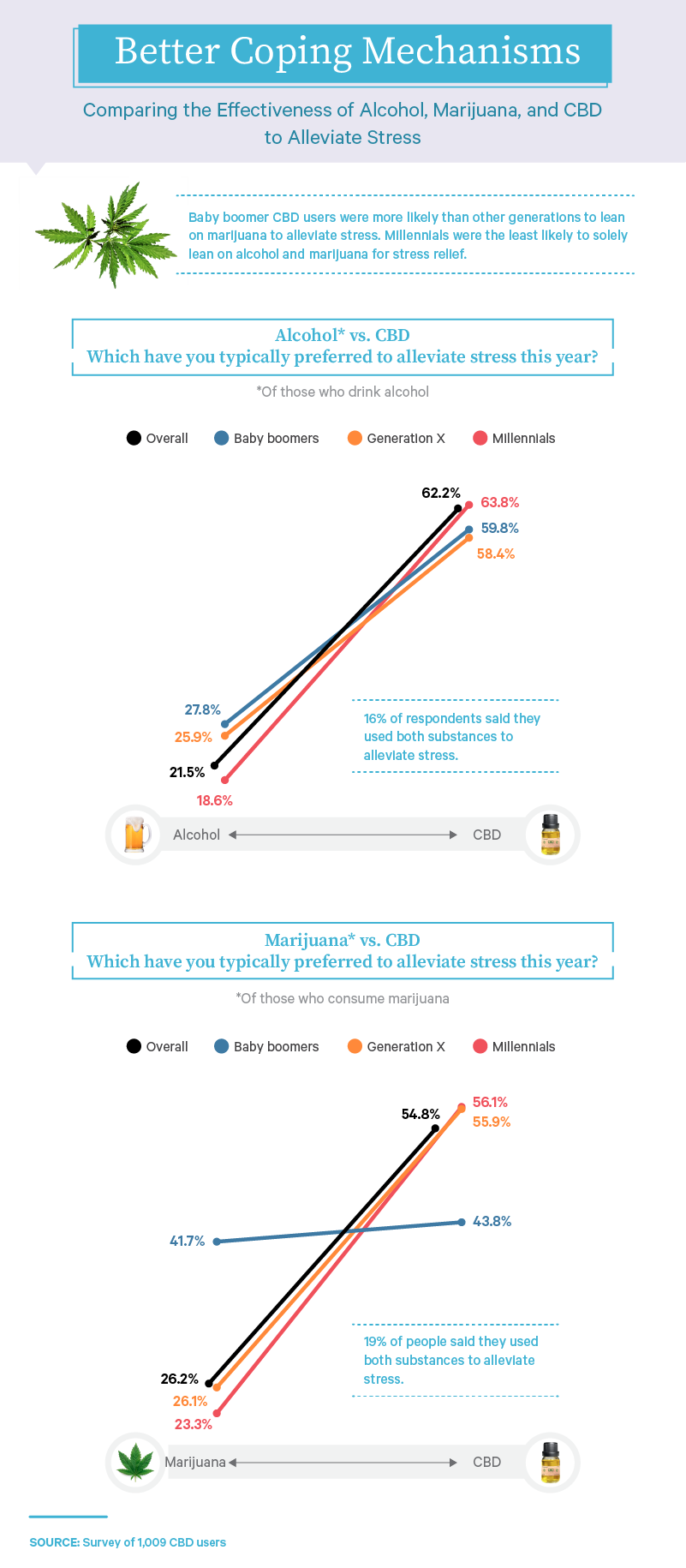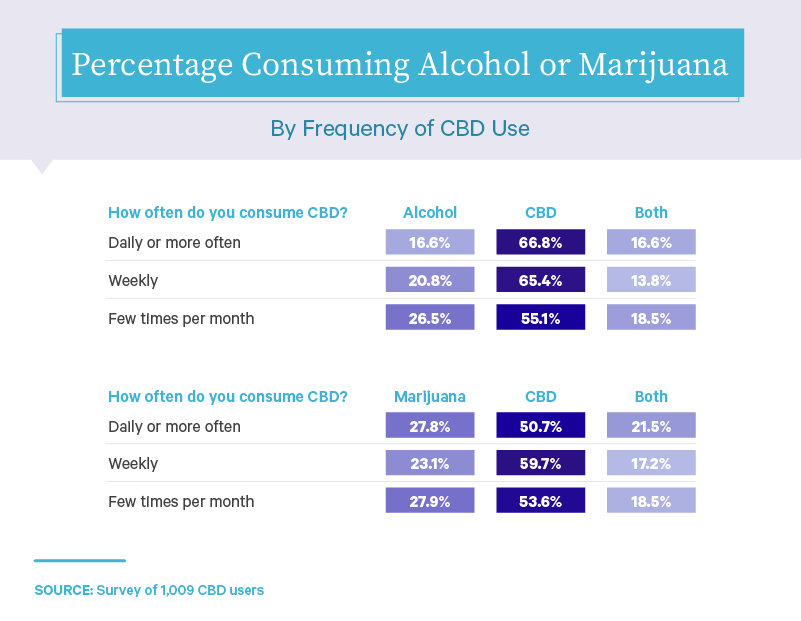With the COVID-19 pandemic dominating most of the year, it may be easy to forget some of the other wild things that happened (not to mention the 2020 presidential election), but the end result was the same for most people: stress.
Experts say Americans are possibly more stressed out than they’ve ever been, which has left us feeling restless, struggling to concentrate, and overwhelmed. Even as the year comes to a close, the impact of COVID-19 on school, work, home life, and virtually everything in between has many people feeling uncertain about the future and what the new year might look like.
So how are people coping with the major events of 2020 and the “new normal” of stressors in their life? For some, the answer might be cannabidiol (CBD). For a closer look at managing stress and mental health during the pandemic, we surveyed over 1,000 CBD users and asked them how they’re taking the edge off. Read on as we explore how many people are using CBD products in 2020, how it’s helping them manage their stress, and what the most popular forms of CBD are among those we polled.
Navigating Stress From the Pandemic
Whether it’s the pressure of looming work deadlines, politics, or finances, it’s not uncommon to feel stressed out from time to time. Navigating occasional stressors might feel natural, but constant, recurring stress can manifest in our physical and mental health in profound ways. Without realizing it, stress can lead to headaches, fatigue, and irritability that manifest into negative habits that can be harder to kick.

Among the more than 1,000 people surveyed, 21% said they started consuming CBD for the first time in 2020, and 13% said they started using CBD specifically because of the pandemic. Among those who had already been using CBD, 1 in 4 people reported having increasing consumption as a result of the COVID-19 pandemic.
2020 has been a difficult year to navigate for most people, and the global pandemic was overwhelmingly identified as the most stressful aspect of it. Sixty-two percent of respondents said they used CBD to manage the stress caused by the pandemic in general, followed by 59% using CBD to cope with the shutdown and isolation caused by COVID-19, and 45% who used CBD to cope with stress caused by the current rise in COVID-19 cases. Many people are struggling to deal with the pandemic, but that hasn’t been the only stressful part of 2020. CBD users also turned to cannabidiol to help manage stress caused by the presidential election (40%), pandemic-related unemployment (32%), Black Lives Matter protests (24%), cases of police brutality (24%), and the California wildfires (20%).
Who Uses CBD and Why?
Research continues to support that cannabidiol, a naturally occurring chemical found in cannabis, can help relieve stress. Unlike other compounds in marijuana, CBD doesn’t trigger the intoxication or the “high” often associated with the plant and is legal on a federal level.

More than 1 in 3 (39%) people surveyed indicated CBD was an essential tool in helping to manage their stress or anxiety in 2020, including 49% of baby boomers, 39% of Gen Xers, and 36% of millennials who said it was extremely or very effective. Another 44% of CBD users said it was somewhat effective in managing their stress, and just 17% said it was only slightly effective. Most commonly, cannabidiol users use CBD to help alleviate stress (62%), anxiety (60%), and restlessness (42%). While less common, 41% of CBD users also used it to help alleviate some aspects of depression they were experiencing, followed by difficulty falling asleep (39%) and worry or fear (39%). According to their responses, CBD users found it was the most effective in helping them manage their anxiety (65%), trouble sleeping through the night (63%), and trouble falling asleep (61%). Baby boomers most often utilized CBD to help manage their anxiety, while Generation X users and millennials turned to CBD to help manage stress.
Comparing CBD to Alcohol and Marijuana
While 16% of respondents said they used both alcohol and CBD to cope with stress in 2020, 62% said they preferred using CBD products, compared to 22% who preferred alcohol consumption instead. Millennials (19%) were the least likely to report preferring to drink to help them manage their stress, followed by Generation X (26%) and baby boomers (28%). Unlike cannabidiol, turning to alcohol to help manage stress or anxiety can cause those feelings to rise over time, triggering higher levels of stress and potential for long-term dependency on alcohol. Drinking when stressed can also disrupt sleeping patterns, reducing the amount of time you spend in REM and making you more fatigued throughout the day.

Another 19% of respondents used both CBD and marijuana to cope with stress from the past year, 55% indicated they preferred CBD compared to 26% who favored marijuana. Baby boomers were the most likely to prefer marijuana (42%), followed by Generation X respondents (26%) and millennials (23%).
Is CBD replacing alcohol and marijuana? When we analyzed preferences for alcohol and marijuana by the frequency of CBD consumption, we found that daily CBD users relied less on alcohol than those who used CBD occasionally.

In contrast, marijuana use was higher among CBD users compared to alcohol, and usage was also similar between daily CBD users and occasional CBD users – indicating that the frequency in which respondents used CBD didn’t change their use of marijuana for stress – unlike alcohol, where respondents reported lower consumption of alcohol with more frequent use of CBD. Perhaps this indicated cannabidiol might have the potential to replace alcohol to help alleviate stress.
Researching Before You Buy
A majority of CBD users researched their purchases before deciding what to buy. Compared to 18% who said they purchase cannabidiol impulsively, 36% spent roughly a day researching options, while 29% took a week, and 17% reported multiple weeks of product research before buying them. Nearly a third of respondents were somewhat familiar with how the CBD in their products were sourced, and more than a quarter (27%) were very or extremely familiar with the process.
Edibles were found to be both the most popular (45%) and most effective (24%) form of CBD. While capsules or pills (36%) and drops (33%) were also popular, only between 16% and 17% of respondents considered them effective. Vaping CBD (32%) was slightly less popular, though 1 in 5 respondents indicated it was effective for their use. On average, people who increased their intake of CBD spent around $108 per month on CBD products, just around $36 more per month than those who kept their CBD consumption rate the same as last year.
Getting the CBD Information You Need
Even if we aren’t all coping with 2020 the same way, the reality is a majority of people are feeling stressed out by navigating the COVID-19 pandemic, politics, and social activism this year (among other things). To help manage their stress, some people started taking CBD for the first time in 2020, and others opted to up their doses. Among the more than 1,000 CBD users we polled, many respondents were more likely to prefer CBD to either alcohol or marijuana as a tool to help deal with the news of the pandemic, rising COVID-19 cases, and in some cases, stress from unemployment.
At Gold Bee, we know that making healthy choices and improving your wellbeing is important, especially during times of high stress and uncertainty. That’s why we are dedicated to bringing you organic, non-GMO forms of relief and relaxation to help you get through the stress of this year and beyond. Not only can you feel good about consuming a wholesome supplement, but our honey-focused line also tastes delicious. Browse our organic products, customer reviews and read up on the benefits of high-quality CBD products for yourself at goldbee.com today!
Methodology and Limitations
We surveyed 1,009 respondents ranging in age from 18 to 88 in order to explore how they used CBD to manage stress this year. We qualified respondents who used CBD at least a few times a month, in order to dive deeper into mental health, the forms of CBD they most preferred, as well as the events that triggered the most stress. The mean age of respondents was 38 with a standard deviation of 12 years. About 47% of our respondents identified as female, and 53% identified as male. Less than 1% identified as nonbinary. Around 57% of respondents were millennials, 26% were Generation X, and 10% were baby boomers. We did not include Generation Z and other respondents in our generational analysis due to insufficient sample sizes.
Survey data has certain limitations related to self-reporting. These limitations include telescoping, exaggeration, and selective memory. We didn’t weight our data or statistically test our hypotheses. This was a purely exploratory project that examined CBD usage for stress management.
Fair Use Statement
Interested in sharing our study about the ways CBD is used to manage stress? Feel free to share this report with like-minded people who may be seeking stress relief, but please do so for noncommercial purposes only. Also, we kindly ask you to link back to our study in order to give us credit for our work!
